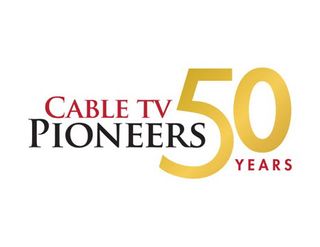Fifty Years of Cable Camaraderie

READ MORE:Big Names Head 50th Class of Cable TV Pioneers | Cable Pioneers: 50 Facts for 50 Years | The Legend of 'Cable TV Pioneer' George Spelvin
It started out in 1966 over a nice dinner at the Americana Hotel in Miami Beach, Fla., celebrating 21 of the cable industry’s most influential members.
This year, the Cable TV Pioneers hosted more than 550 people at its annual dinner gala on May 15 in Boston.
Along the way, it helped create and sustain what is now The Cable Center, the cable industry ’s historical and educational hub, in Denver.
Not bad for an organization that will induct 14 new members to its impressive rolls this year. They are, alphabetically: Jeff Bewkes of Time Warner Inc.; Charles David Cerullo of INSP; Glenn Duval of Challenger Cable Sales; Leslie Ellis of Ellis Edits Inc.; Marwan Fawaz of Sarepta Partners; John Gibbs of Comcast; Steve Goldmintz of Marcum Search; John E. Heslip of Comcast; Yvette Kanouff of Cisco Systems; Peter Kiley of C-SPAN Networks; Mark Lieberman of Viamedia Inc.; Mike Mason of Comcast; John Arthur Ogren of Speed Connect and Brian Roberts of Comcast.
After that first dinner, Fred Stevenson, who ran Rogers TV Cable in Rogers, Ark., sent an enthusiastic letter to all the original pioneers, asking whether any of them would be willing shell out $5 for a color photo of the group taken at the dinner.
‘JUST KEEP BREATHING’
Multichannel Newsletter
The smarter way to stay on top of the multichannel video marketplace. Sign up below.
A couple of weeks later, after hearing from only a couple of pioneers, Stevenson sent out a tongue-in-cheek press release announcing that an organizational meeting of the Pioneers Club had taken place in Stevenson’s office. “Only Mr. Stevenson was present at this organizational meeting and, being eminently qualified for the job, especially because of his age, he was nominated (by Stevenson ), seconded (by Stevenson) and subsequently elected by acclimation (by Stevenson ) to be the new executive chairman or this illustrious new club.”
“When asked what the purpose and goals of the club would be, [Stevenson] replied, ‘No purpose, no goals, no nothing. Just keep breathing.’”
Eventually Stevenson exited the group and Ben Conroy, who started Uvalde Television Cable in Uvalde, Texas, took over. Others who joined in to take leadership roles included Ed Adler of Weston Cable Television Corp.; Sandford Randolph, who built the cable system in Clarksburg, Va.; and Les Read, the HBO executive who has been the group’s executive director since 1996 (and a Pioneer since 1977).
“Les is really the keeper of the flame,” Susan Bitter Smith, the Pioneers board chair and executive director of the Southwest Cable Communications Association, said. “No one can duplicate his knowledge of the history of the Pioneers, the industry, and our members.
“Les knows and keeps track of every member and he has been invaluable not only for those amazing connections, but also for that incredible voice that guides us through the induction dinner every year.”
The Cable Pioneers has always focused on camaraderie, community, friendship and a little networking. The dinners are traditionally formal affairs and held at the same time as the NCTA convention (now known as INTX).
EMBRACING A CAUSE
In 1983, the executive committee decided the group needed a higher calling. Talks took place with Penn State University to form a cable-television museum and learning center at the university.
The museum opened in 1985 with $20,000 in seed money. The Pioneers later undertook a campaign that raised $2 million to provide an endowment for operations and to fund a chair at Penn State.
When the museum moved to University of Denver in 1997, the Pioneers again stepped in to help fund the operations of the Cable Center and expand the Hauser Oral History Project. While the organizations have two distinct boards and responsibilities, the Cable Center board and Cable TV Pioneers board work closely to advance the mission of the Cable Center.
As Mike Pandzik, founder of National Cable Television Cooperative and former chairman of Cable TV Pioneers, said in his oral history of the group: “We’re not involved in world peace. We’re not involved in nuclear disarmament. But in our little corner of the world, I think we do a very good job. And this Cable Center in Denver is a great example of what can happen when you get a bunch of people together who care about each other and care about their industry and want to leave something of substance.”
Added Read: “It’s the finest crowd in the business. You can’t keep an old entrepreneur down. They just keep coming back, like rich people.”
For more about the Cable Television Pioneers, please read on through these pages.
